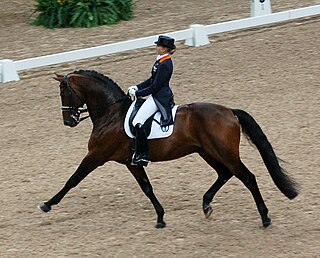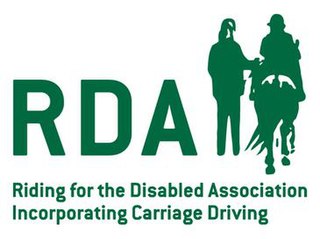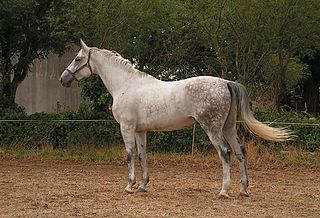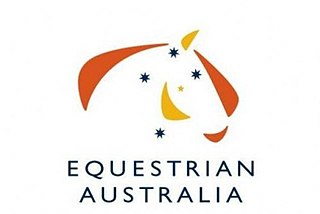
Dressage is a form of horse riding performed in exhibition and competition, as well as an art sometimes pursued solely for the sake of mastery. As an equestrian sport defined by the International Equestrian Federation, dressage is described as "the highest expression of horse training" where "horse and rider are expected to perform from memory a series of predetermined movements".

Equestrianism, commonly known as horse riding or horseback riding, includes the disciplines of riding, driving, and vaulting. This broad description includes the use of horses for practical working purposes, transportation, recreational activities, artistic or cultural exercises, and competitive sport.

A horse show is a judged exhibition of horses and ponies. Many different horse breeds and equestrian disciplines hold competitions worldwide, from local to the international levels. Most horse shows run from one to three days, sometimes longer for major, all-breed events or national and international championships in a given discipline or breed. Most shows consist of a series of different performances, called classes, wherein a group of horses with similar training or characteristics compete against one another for awards and, often, prize money.
The International Federation for Equestrian Sports is the international governing body of equestrian sports. The FEI headquarters are in Lausanne, Switzerland.

Equestrian vaulting, or simply vaulting, is most often described as gymnastics and dance on horseback, which can be practiced both competitively or non-competitively. Vaulting has a history as an equestrian act at circuses, but its origins stretch back at least two-thousand years. It is open to both men and women and is one of ten equestrian disciplines recognized by the International Federation for Equestrian Sports. Therapeutic or interactive vaulting is also used as an activity for children and adults who may have balance, attention, gross motor skill or social deficits.

The United States Equestrian Federation is the national governing body for most equestrian sports in the United States. It also recruits, trains, and governs American teams in international equestrian competition at the Olympics and other competitions governed by the International Federation for Equestrian Sports (FEI).

The Riding for the Disabled Association, also known as the RDA, is a United Kingdom based charity founded in 1969 focused on providing therapeutic horse-riding, equestrian vaulting and carriage driving lessons to people with developmental and physical disabilities as well seeking to improve the lives of those with mental health difficulties. Princess Anne has been the organisations President since 1985.

A sport horse or sporthorse is a type of horse, rather than any particular breed. The term is usually applied to horses bred for the traditional Olympic equestrian sporting events of dressage, eventing, show jumping, and combined driving, but the precise definition varies. In the United States, horses used in hunt seat and show hunter competition are often classed as sport horses, whereas the British show hunter is classified as a "show horse."

Equestrian Australia (EA) is the national governing body for equestrian sports in Australia. These sports include the FEI-recognized disciplines of dressage, eventing, show jumping, equestrian vaulting, endurance riding, reining, para-equestrian, and combined driving. EA also develops and enforces the rules for other events at horse shows.

Horse Sport Ireland (HSI) is the national governing body for all equestrian sport for Ireland. Established in 2008, it is responsible for the administration of international competitions throughout the island, including the Republic of Ireland and Northern Ireland. It sanctions Irish riders and horses competing abroad at international events, and implements the rules and regulations laid down by the FEI. It is recognised by FEI, Sport Ireland, and the Olympic Federation of Ireland.
Equestrian Canada, formerly known as Equine Canada and commonly known by its acronym, EC, is Canada’s comprehensive national governing body for equestrian sport. It is the executive branch of Canada's Olympic and Paralympic equestrian teams; the national association and registry of Canadian equestrian athletes; the national regulatory body for equestrian coaches, competition organizers, and judges; and the national federation of Canadian horse breeders and Canadian breed registries.

Carl Hester is a British dressage rider competing at Olympic level. As of 8 August 2012, the Fédération Équestre Internationale (FEI) rank him 12th in the world riding Uthopia. In 2012, Hester formed part of the Great Britain Dressage team that won gold at the 2012 Summer Olympics.
Para-equestrian classification is a system for para-equestrian sport is a graded system based on the degree of physical or visual disability and handled at the international level by the FEI. The sport has eligible classifications for people with physical and vision disabilities. Groups of eligible riders include The sport is open to competitors with impaired muscle power, athetosis, impaired passive range of movement, hypertonia, limb deficiency, ataxia, leg length difference, short stature, and vision impairment. They are grouped into five different classes to allow fair competition. These classes are Grade I, Grade II, Grade III, Grade IV, and Grade V(Grade Names Changed as of Jan 2017). The para-equestrian classification does not consider the gender of the rider, as equestrines compete in mixed gender competitions.

Richard Davison is an Olympic standard dressage rider.

Patrik Kittel is a Swedish horse rider. He was born in Stockholm. He competed at the 2008 Summer Olympics in Beijing, where he placed fourth in team dressage. At the 2012 Summer Olympics he competed in the team dressage events and qualified for the Grand Prix Special and Grand Prix Freestyle, finishing 14th.
Para-equestrian is an equestrian sport governed by the International Federation for Equestrian Sports (FEI), and includes two competitive events: One is para-equestrian dressage, which is conducted under the same basic rules as conventional dressage, but with riders divided into different competition grades based on their functional abilities. The other is para-equestrian driving, which operates under the same basic rules as combined driving but places competitors in various grades based on their functional abilities.

Ingmar De Vos is a Belgian professional sports manager serving as the thirteenth and current President of the International Federation for Equestrian Sports (FEI). Educated in sports management, business administration and international law, he began his career in mainstream politics before working for the Belgian Equestrian Federation and supported that nation's equestrian teams at the Olympics and the FEI World Equestrian Games. He was one of the founders of the European Equestrian Federation and became secretary-general of the FEI in 2011 prior to being elected President of the organisation in 2014.

Lisa Martin is an Australian para-equestrian. She represented Australia at the 2016 Rio Paralympics and has been selected to compete at the 2024 Paris Paralympics.

South African Equestrian Federation (SAEF) is the national governing body for majority of equestrian sports in South Africa. These sports include the FEI-recognized disciplines of dressage, eventing, show jumping, vaulting, endurance, reining, para-equestrian, and driving, with the non-FEI discipline of tentpegging. SAEF also develops and enforces the rules for other events at horse shows.
The German Equestrian Federation(Deutsche Reiterliche Vereinigung) is an umbrella organization in Germany for equestrian sports and breeding. It is the governing body for the majority of equestrian sports and their organization in Germany, including FEI-recognized disciplines of dressage, eventing, show jumping, vaulting, endurance, reining, para-equestrian, and driving. It also develops and enforces the rules for other events at horse shows. It is colloquially known as FN, short for the international term Fédération Équestre Nationale. The organisation runs the FNverlag, a publishing house for related books and other media














